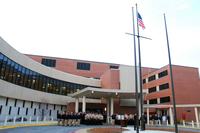
Well, the story of the Israeli incursion into Syria is beginning to get some granularity. It now appears that Israeli commandos may have been involved as well. What a totally gutsy move. And, if true, it also shows that Israel took the target seriously enough to send in ground forces.
Our friends at Stratfor passed this along to us synthesizing the latest information threads:
Another leak appeared via the Sunday Times, this time with enough granularity to consider it a genuine leak. According to that report, the operation was carried out by Israeli commandos supported by Israeli aircraft, under the direct management of Israeli Defense Minister Ehud Barak. It had been planned since June, just after Barak took office, and had been approved by the United States after some hesitation. The target was in fact nuclear "material" provided by North Korea, according to that leak.
All of this makes perfect sense, save one thing. Why the secrecy? If the Syrians have nuclear facilities, the Israelis should be delighted to make it public. Frankly, so should the United States, since the Bush administration has always argued that nuclear proliferation to rogue states, including Syria, is one of the key problems in the world. The Syrians should be spinning the story like crazy as well, denying the nuclear program but screaming about unprovoked Israeli-U.S. aggression. The silence from one or two parties makes sense. The silence from all parties makes little sense.
Looked at differently, Israel and the United States both have gone out of their way to draw attention to the fact that a highly significant military operation took place in Northern Syria, and compounded the attention by making no attempt to provide a plausible cover story. They have done everything possible to draw attention to the affair without revealing what the affair was about. Israel and the United States have a lot of ways to minimize the importance of the operation. By the way they have handled it, however, each has chosen to maximize its importance.
Whoever they are keeping the secret from, it is not the Syrians. They know precisely what was attacked and why. The secret is not being kept from the Iranians either. The Syrians talk to them all the time. It is hard to imagine any government of importance and involvement that has not been briefed by someone. And by now, the public perception has been shaped as well. So, why the dramatic secrecy designed to draw everyone's attention to the secret and the leaks that seem to explain it?
Let us assume that the Sunday Times report is correct. According to the Times, Barak focused on the material as soon as he became defense minister in June. That would mean the material had reached Syria prior to that date. Obviously, the material was not a bomb, or Israel would not have waited until September to act. So it was, at most, some precursor nuclear material or equipment.
However, an intervening event occurred this summer that should be factored in here. North Korea publicly shifted its position on its nuclear program, agreeing to abandon it and allow inspections of its facilities. It also was asked to provide information on the countries it sold any nuclear technology to, though North Korea has publicly denied any proliferation. This was, in the context of the six-party negotiations surrounding North Korea, a major breakthrough.
Any agreement with North Korea is, by definition, unstable. North Korea many times has backed off of agreements that seemed cast in stone. In particular, North Korea wants to be seen as a significant power and treated with all due respect. It does not intend to be treated as an outlaw nation subject to interrogation and accusations. Its self-image is an important part of its domestic strategy and, internally, it can position its shift in its nuclear stance as North Korea making a strategic deal with other major powers. If North Korea is pressed publicly, its willingness to implement its agreements can very quickly erode. That is not something the United States and other powers want to see happen.
Whether the Israelis found out about the material through their own intelligence sources or North Korea provided a list of recipients of nuclear technology to the United States is unclear. The Israelis have made every effort to make it appear that they knew about this independently. They also have tried to make it appear that they notified the United States, rather than the other way around. But whether the intelligence came from North Korea or was obtained independently, Washington wants to be very careful in its handling of Pyongyang right now.
-- Christian







